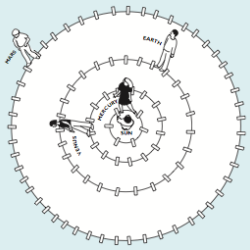Source Institutions
Source Institutions
Add to list Go to activity
Activity link broken? See if it's at the internet archive

In this space science activity, learners work together to create a human-powered orrery to model the movements of the four inner planets. Learners assist in setting up this moving model of the Solar System and take turns playing the roles of Mercury, Venus, Earth, and Mars. As learners observe the orrery in motion, they form conclusions about the orbital periods of the inner planets. Please scroll down to links below for guides (links may be broken on activity landing page). Some files retrieved from Archive.org
- 10 to 30 minutes
- 10 to 30 minutes
- $5 - $10 per group of students
- Ages 11 - 14
- Activity, Lesson/Lesson Plan, Model
- English
Quick Guide
Materials List (per group of students)
- overhead projector or computer with large-screen monitor or LCD projector
- Space Science Sequence CD-ROM (optional)
- prepared key concept sheets from the copymaster packet or CD-ROM file (optional)
- transparency of the map with outer planet orbits drawn in (from Session 3.9, optional)
- a 2.5 meter piece of thin rope or string (made out of material that is not stretchy)
- 36 meters (120') of rope (e.g. cotton clothesline, optional)
- 5 index cards (4 in x 6 in)
- marble or bead, close to 1.4 cm in diameter
- several rolls of masking tape or blue painter's tape or chalk
- scratch paper
- pencils
Subjects
-
Earth and Space Science
- Astronomy
-
Solar System
- The Sun
- The Planets
-
Mathematics
-
Measurement
- Circles
-
Measurement
-
Physical Sciences
-
Vibration and Waves
- Light and Optics
-
Vibration and Waves
-
The Nature of Science
-
The Scientific Process
- Conducting Investigations
-
The Scientific Process
Informal Categories
- Model Building
- Physical Activity
Audience
To use this activity, learners need to:
- see
- read
- be mobile
- touch
Learning styles supported:
- Involves teamwork and communication skills
- Involves hands-on or lab activities
Other
Components that are part of this resource:
- Human-Powered Orrery TEACHER GUIDE (2015)
- Poster version
- Original GEMS Space Science Sequence version (18 pp)
This resource is part of:
Access Rights:
- Free access
By:
Rights:
- All rights reserved, Regents of The University of California, 2007
